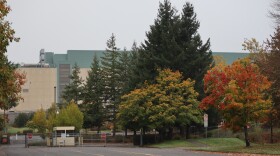-
Some environmental activists are pushing back after the Eugene Water & Electric Board partnered with the University of Oregon to test the school’s gas-powered back-up generator.
-
Scientists know a surprising amount of information about Southern Resident Killer Whales, but once the whales leave their home waters of Puget Sound, their whereabouts become a little more murky, especially off the Oregon coast.
-
Missing and Murdered Indigenous Persons team brings AI-sonar device to search for missing Oregon manThis weekend, on the Confederated Tribes of the Umatilla Indian Reservation, volunteers will search for 71-year-old Wesley Dixon Jones, a CTUIR tribal elder who’s been missing since October 5.
-
Stratacache CEO Chris Riegel talks about taking over a one-million-square-foot manufacturing facility in west Eugene that was once used for semiconductor manufacturing.
-
On this edition, we talk with Professor Nick Allen who led a national study with Google which suggests smartphone use does not negatively impact well-being. And then we check in with Esther Tishman of Liberty Walks on her cross country journey to promote civility.
-
A research summit in Newport has been postponed because of the federal government shutdown.
-
This summer, Gov. Tina Kotek issued an executive order mandating all 197 Oregon school districts ban the use of personal electronic devices during the school day. Districts still have a little time to adopt their phone-free policies –but some have already made the switch.
-
Tillamook-based Aerostar quietly supports space missions with NASA-certified tech, including high-altitude balloons and the only air barrier approved for the ISS — a surprising aerospace hub in Oregon's dairy country.
-
On this edition we talk with Ramón Alvarado and Phil Colbert of the University of Oregon about the ethical and practical considerations of AI in our society.
-
The University of Oregon has been chosen as a hub to study post-fire landslides, hurricane-induced flooding, and related natural disasters.
-
Doctorate students at Oregon State University have conducted an experiment to see how houses in coastal communities hold up to storm surge.
-
The Oregon coast’s only wooden intact lighthouse was reunited with its lantern Tuesday, as the $1.8 million restoration of the Yaquina Bay Lighthouse nears completion.















